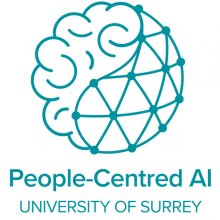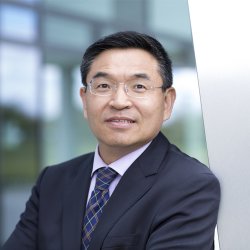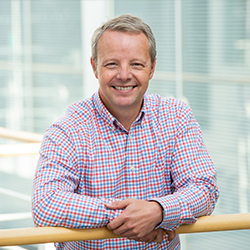

Vision and challenges
The pan-University Surrey Institute for People-Centred AI (PAI) brings together world-leading AI and domain expertise to shape AI for public good.
Our vision
Our vision is for the University of Surrey to become the national centre of excellence in people-centred AI research, training and innovation, and its application for the benefit of society.

Surrey Institute for People-Centred AI
PAI brings together Surrey’s core AI-related expertise in vision, speech and signal processing, computer science, and mathematics, with its domain expertise across engineering and the physical sciences, human and animal health, law and regulation, business, finance and the art and social sciences.
PAI is spearheaded by visionary academics with a passion for collaboration and co-creation, and a deep commitment to people-centred AI. With this distinctive approach, the academic team builds on Surrey’s excellent track record of collaboration with industry, the public sector, government and other relevant institutions to develop innovative ideas and foster new research directions.
Putting people at the heart of AI

PAI’s unique founding tenet is that the starting point for AI should be people rather than technology. This people-centred approach drives our research and enables us to design AI technologies and systems which are ethical, responsible and inclusive.
PAI is a unique environment for visionary academics to shape the future of AI within a collaborative community of co-creators. We work with the next generation of inspiring research leaders with a passion for shaping AI to create a brighter future for everyone.
PAI puts people at the heart of AI by focusing on tackling six grand challenges for the benefit of society:
Why people-centred AI?

The Surrey Institute for People-Centred AI envisions humans and machines working in harmony for the public good.
Many worry that machines will take jobs away from people. An equally compelling concern is that our lives could be governed by systems that are biased, unethical and exclude parts of society. PAI’s vision for AI directly addresses these concerns.
“Our vision is for people and machines to work in harmony, creating systems which are inclusive, ethical, responsible, and put the needs of people first,” says Professor Hilton, founding Director of the Institute.
“In the future, AI will impact almost every area of life – from how we manage our money to how we diagnose disease. Research in AI needs to break down barriers between disciplines to ensure that we consider and shape its impact from every angle for the benefit of us all.”
With this in mind, PAI became Surrey’s first pan-University community of interdisciplinary co-creators with expertise in areas such as law, business, education, communication, and human and animal health, as well as the fundamentals of AI. It builds on the University’s long-established excellence in the field: our sister institute, the world-leading Centre for Vision, Speech and Signal Processing (CVSSP), has been ranked Number One for Computer Vision since records began.
Professor Hilton believes that Surrey is perfectly placed to drive AI research which addresses society’s grand challenges and has people at its heart.
Foundation of the Institute
The University of Surrey has a proud history of collaboration, both cross-university and with industry, government and leading organisations internationally to realise transformative advances with real-world impact. This, combined with world-leading core and domain expertise, create the potential for Surrey to lead the future impact of AI on people and society.
Surrey leads in both foundational AI research and practical applications. We pioneer new theories to understand AI systems and develop cutting-edge audio-visual technology. Our AI solutions focus on people, with applications in healthcare, security, creative industries, and the digital economy.
The AI@Surrey cross-university research network, established in 2018, demonstrated the breadth of AI related research across the University, including many research groups, from fundamentals (CVSSP, computer science, mathematics) to applications:
Faculty of Engineering and Physical Sciences
- Advanced Technology Institute
- Chemical and process engineering
- Institute for Communication Systems
- Mechanical engineering sciences
- Physics.
Faculty of Health and Medical Sciences
- Health
- Nutrition
- Psychology
- Sleep
- Veterinary science.
Faculty of Arts and Social Sciences
- Business and finance
- Hospitality
- Institute of Sound Recording
- Language
- Law
- Sociology and criminology.
Today, PAI gives Surrey the potential to lead AI for the benefit of society through its unique collaborative research environment.

AI@Surrey network meeting.








